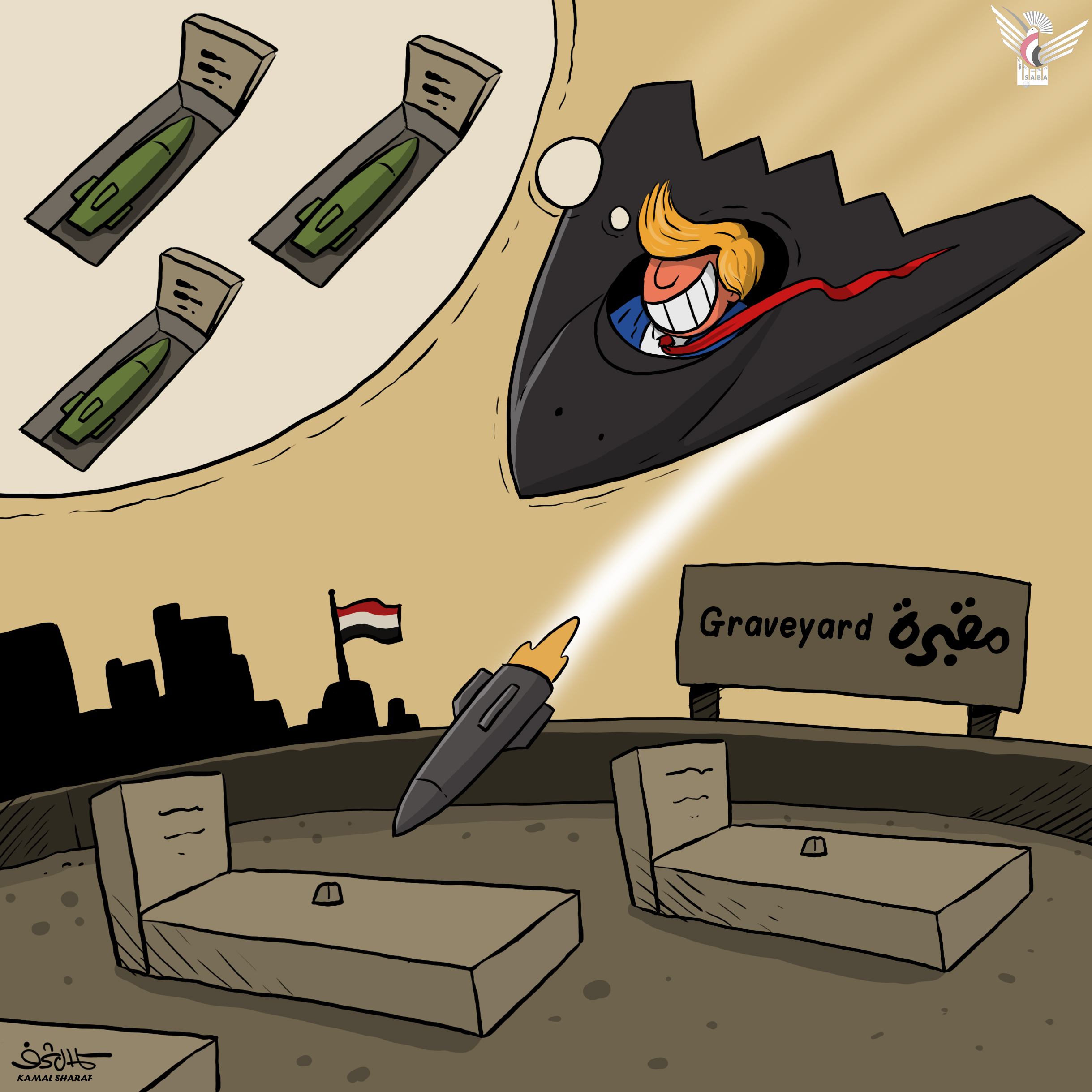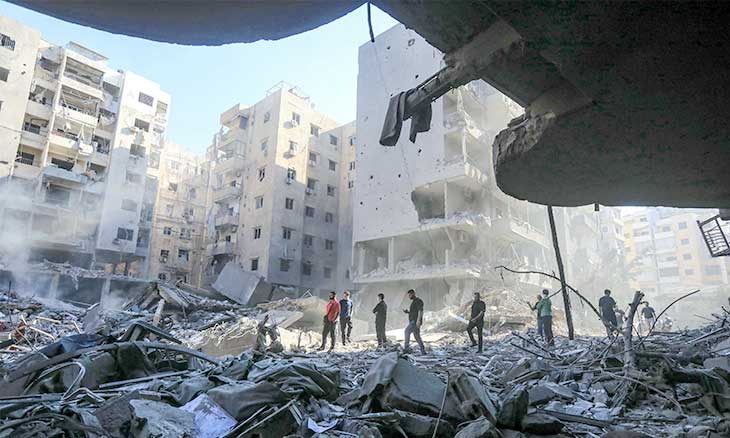Sana'a - Saba:
As soon as the skies of Lebanon began to be free of Zionist warplanes as a result of the ceasefire agreement between the Zionist entity and Hezbollah, armed factions led by Hay'at Tahrir al-Sham, or the terrorist-designated Al-Nusra Front, along with foreign forces, largely believed to be Ukrainian, Turkish and mercenaries, began an aggressive armed attack on Aleppo and other Syrian cities in a clearly defined U.S.-Zionist-Turkish scheme.
In just 72 hours last week, the armed groups launched a surprise attack on Aleppo and seized the city in a major escalation of a largely dormant war. The armed groups' attacks are part of a US-Zionist-Turkish plan that took several months, if not more, to prepare in closed secret rooms, according to many observers and analysts.
On Saturday, Syria appeared to be on the brink of a new round of war, after armed factions, in a surprise offensive, managed to control large areas of Aleppo and Idlib provinces and advance towards Hama, ending a years-long truce that was the result of understandings reached by key parties to the conflict, especially Russia, Turkey and Iran.
Egyptian political thinker Mustafa Elfeki said that what is happening in Syria is to be expected amidst a state of complete chaos and massacres in the Middle East as a whole.
Elfeki said during a phone interview with Al-Qahera and Al-Nas TV on Sunday: "What is happening in Gaza, what is happening in Lebanon and what is happening in Syria should not be separated from what is happening in Syria, all of which are part of a single system aimed at adapting the Arab countries in the region to the policy of the United States and its allies in a sharp and strong way," he said.
He added: "It is the turn of Iraq."
He emphasized that there is an attempt to change the situation in the region to make it more favorable to the Israeli tide and to undermine the status of the Arab peoples.
He stated that the danger is great, imminent and coming and cannot be ignored. He pointed out that it targets everyone without exception.
The US State Department announced that Secretary of State Antony Blinken and his Turkish counterpart Hakan Fidan discussed the latest developments in Syria and ceasefire efforts in Gaza over the phone on Sunday evening.
While faction fighters were celebrating in the squares of Aleppo, the largest city in the north of the country, and in front of its historic castle, the Syrian army announced its withdrawal from Aleppo in preparation for a counteroffensive, according to the Syrian government. The withdrawal was not limited to Aleppo, but extended to the Idlib countryside, which fell completely into the hands of the factions, most notably Hayat Tahrir al-Sham (HTS) and al-Nusra front.
As the evening wore on, reports circulated that the militants had begun entering Hama city, which the Syrian army denied and launched a counter-attack. The Syrian army was able to retake some areas from Syrian opposition forces around the city of Hama following a counter-offensive after midnight on Tuesday-Wednesday.
The official Syrian News Agency (SANA) announced that the army was able to "expand the security of the city (Hama) by about 20 kilometers" after eliminating militants and destroying their vehicles.
The agency said that the army is continuing its operations against the positions and axes of movement of the Syrian opposition forces in the northern countryside of Hama.
A military source was quoted as saying: "Large military reinforcements arrived in the city of Hama to reinforce the forces on the front lines and counter any attack attempt by armed terrorist organizations."
On Tuesday, the Pentagon announced that it had carried out a strike targeting weapons systems in eastern Syria.
Pentagon spokesman Major General Pat Ryder said the US military struck weapons systems including three mobile rocket launchers and a T-64 tank on Tuesday after shells were fired at US forces at the Euphrates Military Support Site.
Russia and the United States clashed at the United Nations, accusing each other of supporting "terrorism" during a Security Council meeting triggered by the sudden escalation of fighting in Syria.
US Deputy Ambassador to the United Nations Robert Wood called for a de-escalation of the fighting in Syria and the protection of civilians. He also expressed concern that the attack was led by Hayat Tahrir al-Sham.
In remarks addressed to Wood, Russian Ambassador to the UN Vasily Nebenzya said: "You don't have the courage to denounce a clear terrorist attack on peaceful civilians in peaceful Syrian cities."
While Russian warplanes launched strikes to halt the faction advance, Russian Foreign Minister Sergei Lavrov held phone talks with his Turkish counterpart Hakan Fidan, and Tehran condemned what it described as a terrorist attack on its consulate in Aleppo.
The Zionist entity's success in assassinating Sayyef Hassan Nasrallah, Secretary General of Hezbollah The leader of the strongest and most influential arm of the "Axis of Resistance" was a turning point in the confrontation in the region, while the war criminal Netanyahu sought to escalate in the region and involve its peoples in a long-term regional war that only he and his extremist clique want, according to analysts.
Analysts believe that the goal of Netanyahu's repeated provocations against the axis of resistance, and the escalation reaching its end with the US intervention with its military mobilization, to explode a regional war in the region, and exacerbate and deepen the war by targeting Iran's nuclear facilities, so that Netanyahu's recklessness succeeds in igniting the region from the Mediterranean to the Persian Gulf.
Many locals believe that the aim of the attacks on Syria is to dismantle what is known as the Axis of Resistance and the unity of the arenas that support Gaza in particular and Palestine in general.
The events of the Syrian crisis began in mid-March 2011 when demonstrations broke out in cities across Syria and by July 2011, the events caused thousands of local residents to flee to neighboring countries, most notably Turkey, Lebanon, and Jordan. At some point, the events caused thousands of local residents to migrate to neighboring countries, most notably Turkey, Lebanon, and Jordan.
With the development of the crisis in early August 2011, military confrontations began on a small and limited scale between regular forces and armed groups, then gradually expanded until they reached the level of direct battles by the end of the year and the beginning of 2012.

| more of (Reports) |




